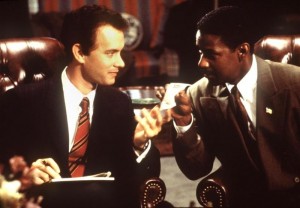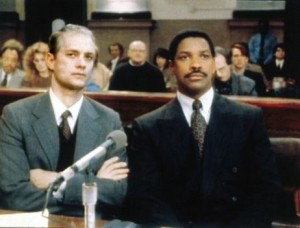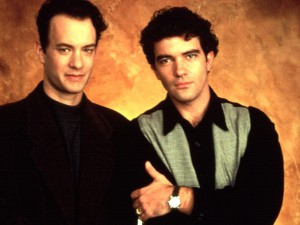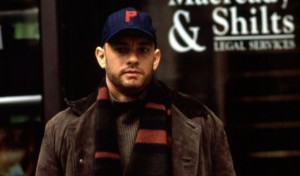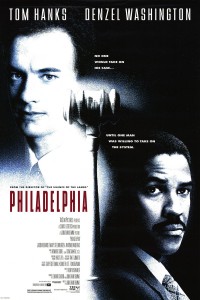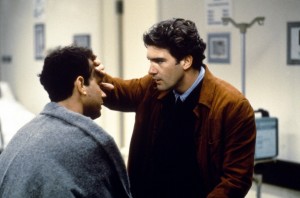Philadelphia **** (1993, Tom Hanks, Denzel Washington, Antonio Banderas, Jason Robards, Joanne Woodward) – Classic Movie Review 283
Director Jonathan Demme made Hollywood’s first mainstream cinema AIDS movie in 1993, following the controversy over his film The Silence of the Lambs in 1991, when there were gay protests against the portrayal of the film’s serial killer Jame Gumb. Philadelphia and the earlier TV movie And the Band Played On signalled a significant shift in films towards more realistic depictions of gays and lesbians.
Thanks mainly to its high-profile casting and its triumph at Academy Awards time, Philadelphia was a huge and important success as an opinion changer and at the box office. A win-win situation, that, for a change. It took $260million worldwide against a cost of only $26million.
Tom Hanks won his first Best Actor Oscar (he won again next year for Forrest Gump) for his highly stirring and deeply emotional performance as Andrew Beckett, a young lawyer with AIDS, who is fired by the evil homophobes at his conservative law firm. They claim they fear that their staff might contract AIDS from him. He retaliates by hiring homophobic, reluctant small-time lawyer Joe Miller (Denzel Washington), who is apparently the only advocate even vaguely willing to take his case of a wrongful dismissal suit against his boss, Charles Wheeler (Jason Robards Jr).
Wheeler responds by hiring an eager white female lawyer, Belinda Conine (Mary Steenburgen). During the court battle, Miller finally comes round to the conclusion that Beckett is no different from anyone else, finally ends his homophobic views and puts his whole muscle behind Beckett and his case before AIDS overwhelms him.
Unless you’re actually homophobic, it’s impossible not to respond to this good-natured, warm-hearted and supremely emotional appeal for fairness and tolerance. But the care involved in smoothing out life’s rough edges to appeal to the widest possible audience slightly shows in a screenplay that’s occasionally too schematic and unsubtle, showing its effort at times.
The side-lining of what should be the story’s main central relationship of Beckett and his long-time gay lover Miguel Alvarez is especially disappointing. it’s fortunate then that Miguel is played convincingly, warmly and expertly by an ideally cast and sympathetic Antonio Banderas. That is, at least when he gets a little screen time and a look in in the drama. Hanks later said that scenes showing more affection between him and Banderas were cut out, including one with him and Banderas in bed together. The DVD includes this scene.
More oddly, Beckett’s family is also side-lined and we get far too little of Joanne Woodward, who is perfect as his mother Sarah. This throws the weight away from the gay story in the long central section of the picture, which is simply an excellent courtroom drama of a kind that could appear in any movie, indeed you expect Perry Mason to pop in at any moment.
However, Hanks is outstanding, effortlessly and shamelessly milking the tears as the dying protagonist, and old hands Robards and Steenburgen make a huge, tasty banquet out of their villain roles. However, Washington isn’t quite on his top form, and seems a shade uncomfortable as the lawyer, sometimes uneasy where to put the emotional stress.
Demme handles it all in a straightforward, sincere fashion, except in one red-lit sequence where Hanks mimes to a Callas aria, which is simultaneously impressive and embarrassing.
A gay movie, made mostly by and with straight people with non-gay audiences mainly in mind, Philadelphia is disappointingly conventional. Yet it is incredibly well-meaning, hugely entertaining, significant and influential, and an important milestone in the movies. Its goodness wins through.
Bruce Springsteen won best original song for Streets of Philadelphia on his first try at a movie tune and Neil Young was Oscar nominated for the title theme song Philadelphia.
Inspired by events in the lives of attorneys Geoffrey Bowers and Clarence B. Cain.
Bowers was an attorney who in 1987 sued the law firm Baker & McKenzie for wrongful dismissal in one of the first AIDS discrimination cases. Cain was an attorney for Hyatt Legal Services, who was fired after his employer found out he had AIDS. He sued Hyatt in 1990 and won just before his death.
The credits say: ‘This motion picture was inspired in part by Geoffrey Bowers’ AIDS discrimination lawsuit, the courage and love of the Angius family and the struggles of the many others who, along with their loved ones, have experienced discrimination because of AIDS.’
Demme has said he wanted to direct the film after his friend, the illustrator Juan Suarez Botas, was diagnosed with AIDS.
There were five Oscar nominations and just the two wins: best actor for Hanks and best song for Streets of Philadelphia. The screenwriter Ron Nyswaner was also nominated for an Oscar for Best Original Screenplay but lost to Jane Campion for The Piano.
The ‘stately homo’ of England, Quentin Crisp appears as one of the party guests.
A few days before Philadelphia was released on February 25, 1994, in the UK , AIDS claimed the life of another British gay saint, filmmaker Derek Jarman, on February 19, 1994, aged 52.
(C) Derek Winnert 2013 Classic Film Review 283 derekwinnert.com

